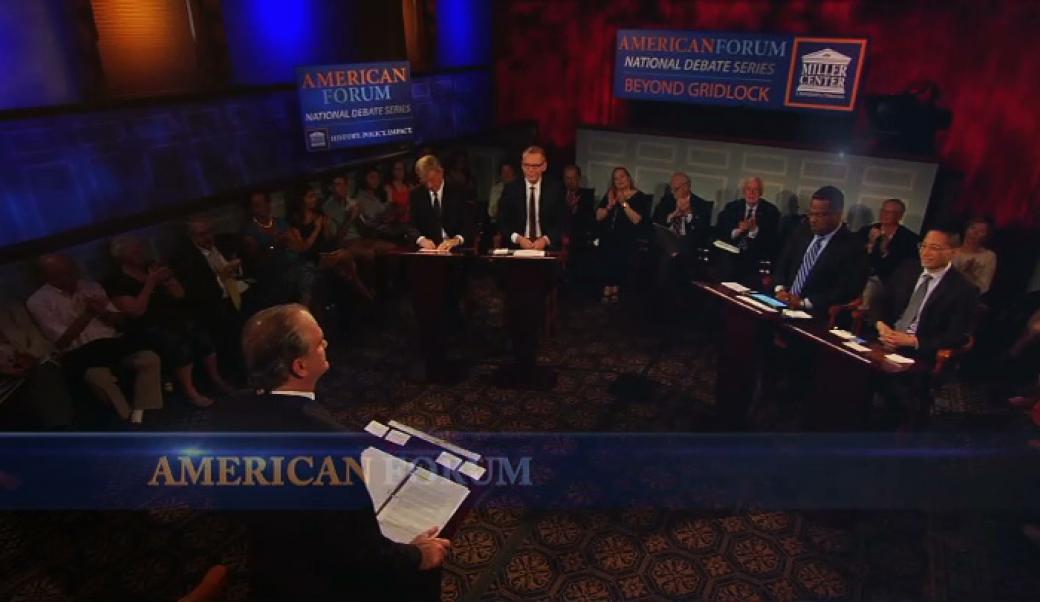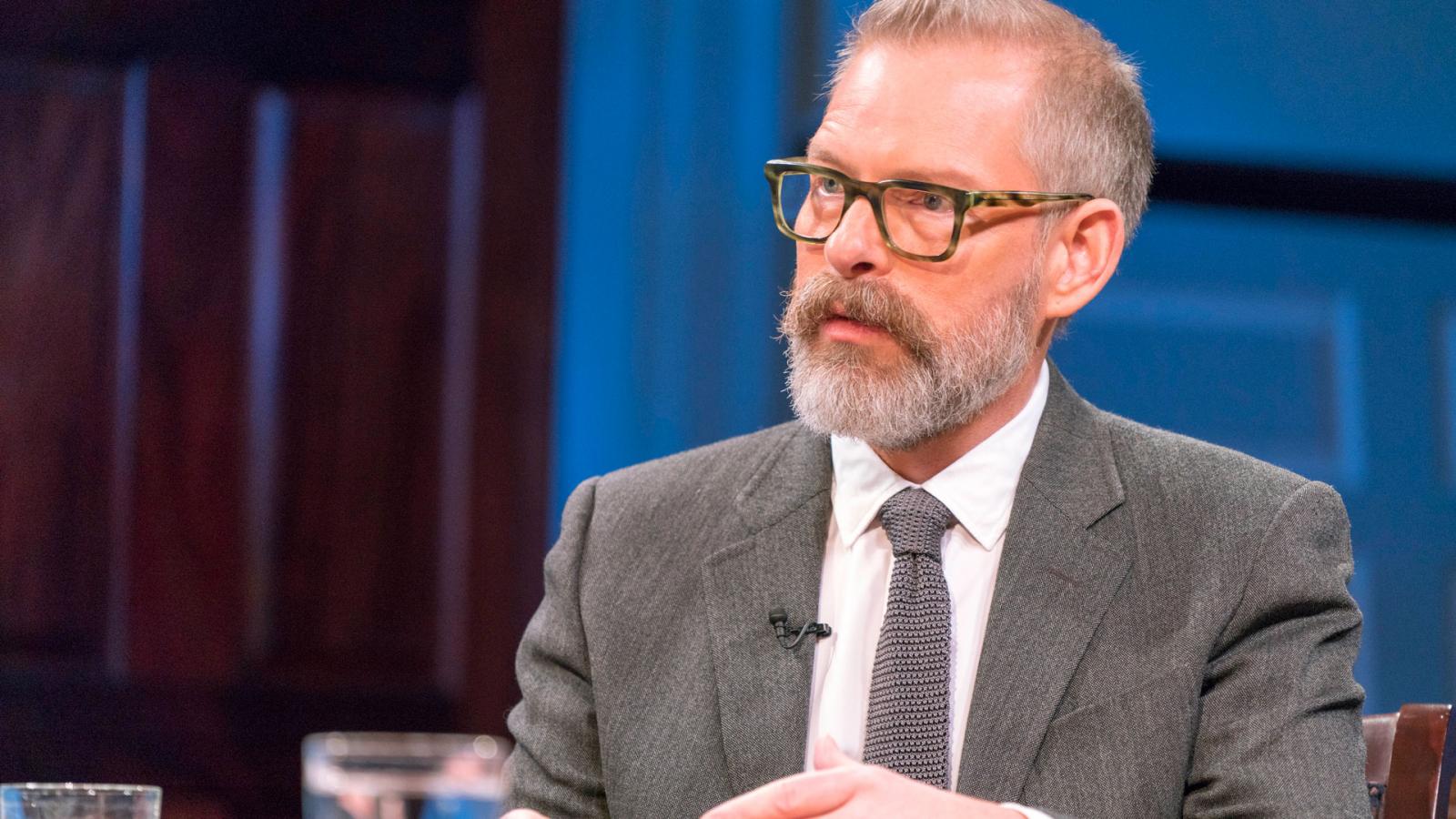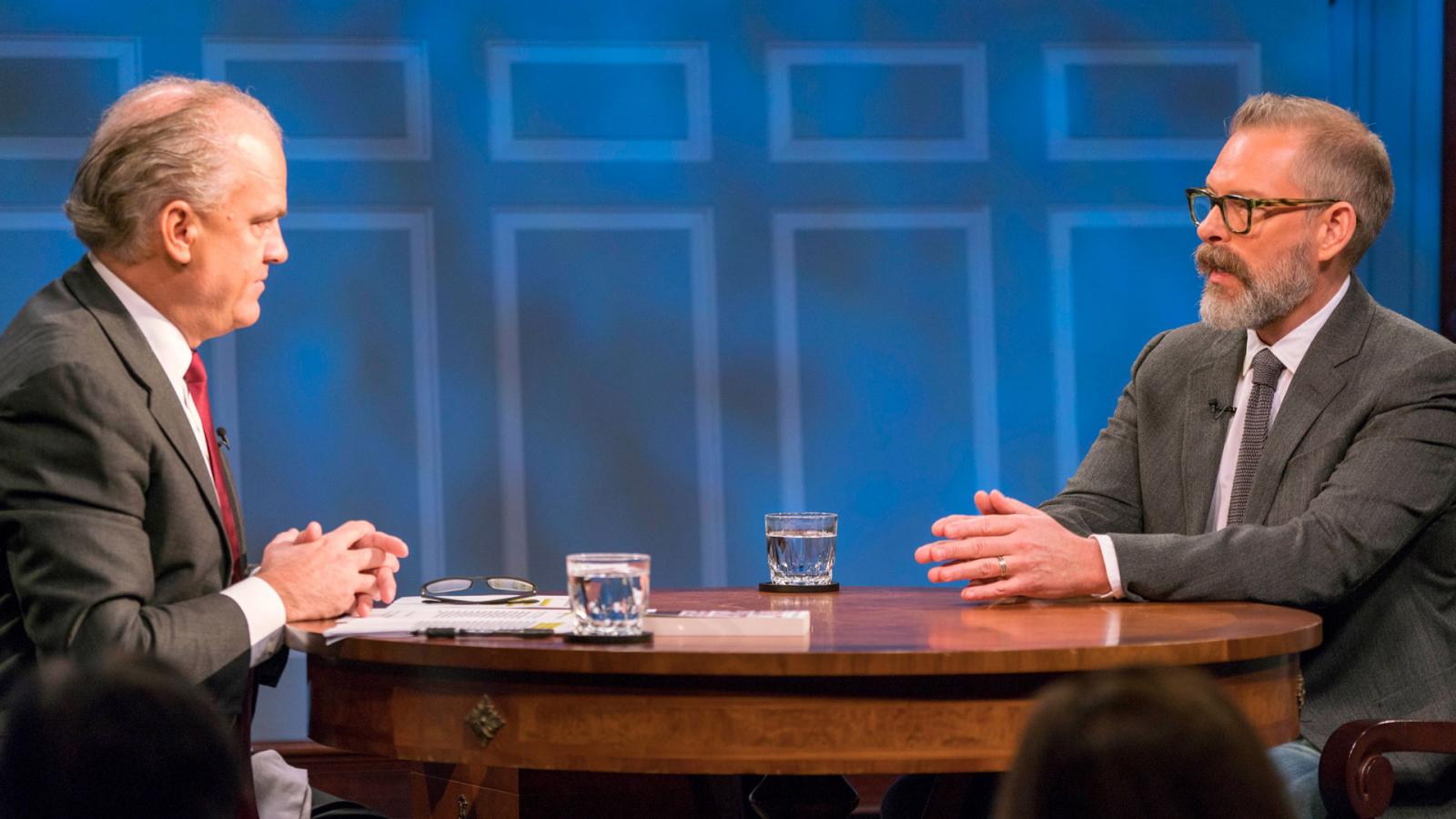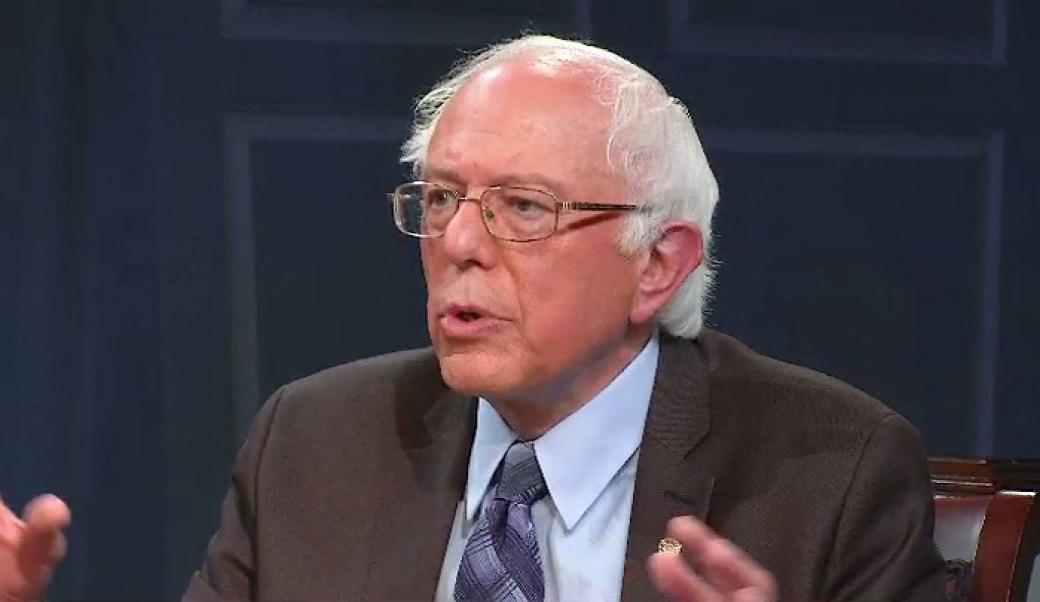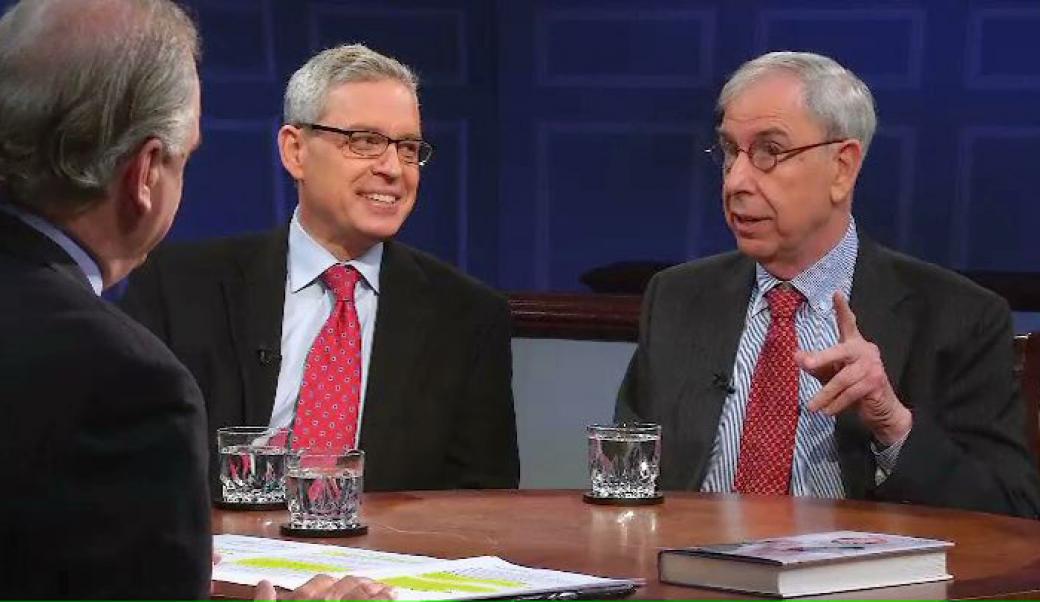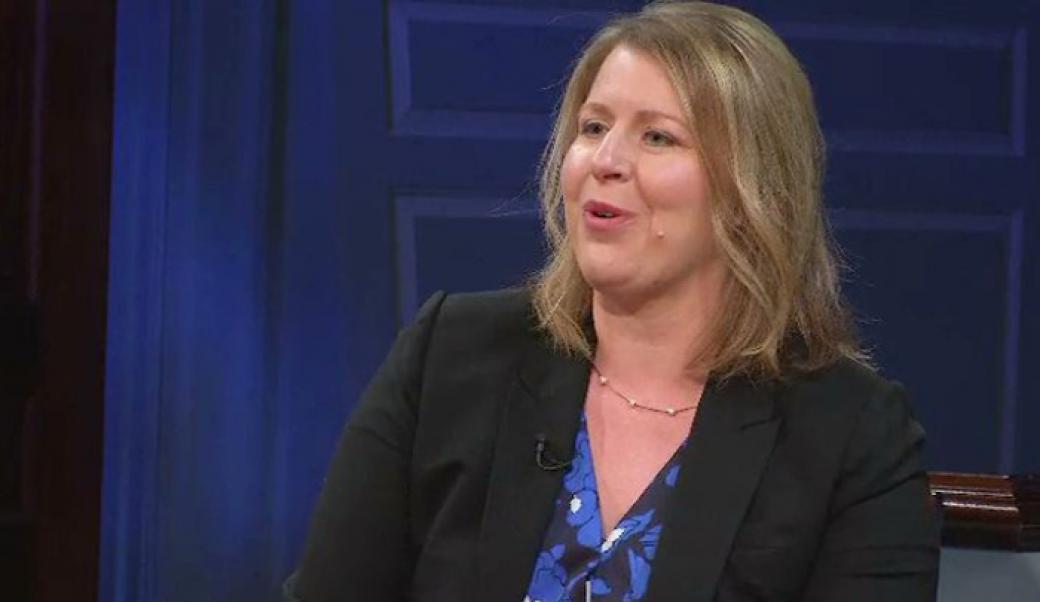About this episode
December 09, 2016
Matt Kibbe
The populist revolt against both major parties and the Washington establishment began most clearly with the rise of the Tea Party back in 2010. In 2016, the most powerful elements of the populist uprising abandoned some of the better-known Tea Party favorites to support Donald Trump, a candidate backed by very few national Tea Party figures—such as this week’s guest, Matt Kibbe.
Political Parties and Movements
The future of the Tea Party
Transcript
0:51 Douglas Blackmon: Welcome back to American Forum. I’m Doug Blackmon. The presidential election of Donald Trump on November 8 was a stunning shock to almost all political analysts—even the ones who had supported him. But the forces that delivered Mr. Trump that victory have been vigorously at play in American politics for many years. The populist revolt against both major parties and the Washington establishment began most clearly in the sudden rise of the Tea Party back in 2010.
FACTOID: The Question: What’s the future of American conservatism?
In the years since, that wave of fury toward what has been called the “political elite” has been a force more powerful and unpredictable than its leadership. It swept away the Democratic majority in the House of Representatives after passage of President Obama’s signature health care law. But then the Tea Party began splintering into sometimes contradictory efforts. Tea Party organizations were never quite able to consolidate into a unified force. It was a minor player in the 2012 presidential election, and then in 2016, the most powerful elements of the populist uprising abandoned some of the better known Tea Party favorites—Senators Rand Paul, Ted Cruz and Marco Rubio—to support Donald Trump—a candidate backed by very few national Tea Party figures—such as our guest today, Matt Kibbe. He is the former president and CEO of FreedomWorks, an organization that seized on the tea party movement early on and became one of the most influential such groups. In the 2016 election, Kibbe initially backed Senator Rand Paul. After he dropped out of the race, Kibbe turned to Libertarian Candidate Gary Johnson. He is the author of several books, most recently, Don’t Hurt People and Don’t Take Their Stuff: A Libertarian Manifesto. Matt, thank you for being here.
Kibbe: It’s good to be back, Doug.
2:39 Blackmon: So we’ve just had an election that turned out differently than a lot of people expected. Um I want to read something to you that uh was posted online at 2:40 a.m. on election night by David Remnick the editor of the New Yorker Magazine uh and I want to preface this by saying that these are David Resnick’s words and views not mine or not American Forum uh but I want to I want to read just these couple of sentences and hear your reaction to them. Uh David Remnick wrote “The election of Donald Trump to the presidency is nothing less than a tragedy for the American republic, a tragedy for the Constitution and a triumph for the forces at home and abroad of nativism, authoritarianism, misogyny and racism. Trump’s shocking victory, his ascension to the presidency is a sickening event in the history of the United States and liberal democracy.” What do you make of that?
Kibbe: Well I’ve been a very vocal critic of Donald Trump I think before most people were and I worry about one thing about Donald Trump and it is that authoritarian attitude that he has but I think we should take a step back today and understand some of the dynamics that led to people supporting Donald Trump. There’s a lot of economic anxiety, there’s a lot of distrust in the political establishment, and we have no idea how Donald Trump is going to govern and I think we should be prepared for the worst, but we should also um know that our system, our republic is very robust and I have a lot of faith that we can we can get somewhere positive out of this.
4:21 Blackmon: Let’s talk about how we did get to this and what I referred to in the introduction. Do you buy that proposition that I put out that the Tea Party movement certainly was the accelerant uh it’s not really the Tea Party movement now exactly that delivered Donald Trump to the White House, but it’s a big part of it and it was the energetic accelerant. Uh, but do you take that proposition?
Kibbe: So I like to say that Donald Trump broke the Tea Party right in half and I think that politics ultimately corrupted what used to be a cohesive political philosophy that united the early Tea Party movement, but appreciate the dynamics that created the Tea Party, the intermediation and social media and uh the decentralization of knowledge and information that happened before the Tea Party and Donald Trump is probably one manifestation of that but so is the pirate party in Iceland. There is a general dissatisfaction going on with the political establishment in Washington DC. There is an easier ability to find out some of the corrupt things that go on, the collusion between businesses and media and political interests and the Tea Party certainly was the boiling point right? That was the moment when people could use social media to self-organize, where they could find out alternative views on things, but certainly Barack Obama in 2008 was a predecessor to that I mean we go back to Howard Dean and Rand Paul and fast forward and here we are with Donald Trump and whatever else he is he is capital change right? He is big seat change and that’s what people are looking for right now, they don’t trust the system, they think both parties are corrupt and he was the outsider at the moment when everyone wanted an outsider.
FACTOID: Rep. Ron Paul ran as Libertarian in 1988, Republican in 2008, 2012
Blackmon: But you made reference just a second ago to the idea that Trump broke the Tea Party. But so how is it that Donald Trump has broken that?
Kibbe: So half of that and I saw this in Iowa when I was working for Rand Paul, the assumption for Rand is that he would start with Ron Paul’s base in Iowa which was substantial and build up from there. But what we discovered was that half of the Rand Paul movement was liberty, constitutional government, restraint of federal power and the other half was outraged at the machine, they didn’t trust the establishment.
FACTOID: Senator Rand Paul sought GOP presidential nomination in 2016
They were pissed off about it and they wanted to break it. And I think that by the way, you could describe the Bernie Sander’s movement the same way ad you could certainly describe Donald Trump that way and for the Tea Party, in the early days 2008 to 2009 leading into the 2010 election, every Tea Party would tell you the same thing about what the Tea Party was, constitutional, limited government, fiscal responsibility and individual freedom, they all said the same thing. It was a fascinating social dynamic, but then politicians started jumping up on stage and Sarah Palin sort of took over you know “I’m the Tea Party” and you know Michelle Bachmann did the same thing. And for Donald Trump, the people that want to rage against the machine, they’re all in for Trump. The people that believe in constitutional and limited government and limiting the power of the presidency, they’re never ever Trump. And so now the Tea Party is split in half. But I think those two dynamics are going to reshape both political parties and the you know, Sander’s movement, what happens to those guys? What happens to the liberty movement moving forward because all of this stuff is swirling around and if you just want to put it all in a let box and a right box, you’re missing the point.
FACTOID: Support for Tea Party dropped from 32% in 2010 to 17% in 2015
7:59 Blackmon: Let me go back to Remnick for a second, in terms of where this is all going to go. And here, a few more lines from the same piece that David Remnick, the editor of the New Yorker posted in the middle of the night after the, it was clear where the results of the election were going. Um, Remnick wrote: “There are inevitably miseries to come. An increasingly reactionary Supreme Court, an embolden right-wing Congress, a president whose disdain for women and minorities, civil liberties and scientific fact say nothing of simple decency has been repeatedly demonstrated, his vulgarity unbounded. A knowledge-free national leader who will not only send markets tumbling but strike fear into the hearts of the vulnerable, weak, and above all, the many varieties of “other” whom he has so deeply insulted African Americans, Hispanics, women, Jews, Muslims. The most hopeful way to look at this grievous event—and, it’s a stretch—is that this election and the years to follow will be a test of the strength, or fragility, of American institutions, a test of our seriousness and resolve.” Is it that dark?
Kibbe: Uh, no. I don’t think it’s that dark and I think that sort of attitude from media elites is precisely what people are reacting against. I think the American people are better than that, and I think our democracy and our republic is better than that. But, I think we should push back against any party, any president, Republican or Democrat, that wants to go after fundamental rights in our Bill of Rights, and I’ve seen both parties go after the First Amendment, go after the Second Amendment, go after the Fourth and Fifth Amendment, and I’m one of those guys who thinks that the Bill of Rights is a pretty cool roadmap for how we keep the government from going too far.
9:43 Blackmon: What do we do about, thought, and you know I hope I’m establishing here that I’m against expectations, I’m somebody who has been open to the validity of, of these political phenomena, and, but nonetheless, it’s also the case that, you know, the famous events of, when the final vote was about to be taken on the health care bill and the sort of first giant moment of the Tea Party surrounding of the Capitol. John Lewis and others entering the Capitol building and then saying he’d been spit on and been called racial epithets and things, um, and lots of debating and arguing about if that really happened or not. I think the bottom line is that a version of those things did happen on that day, and a version of similar things have happened at another time. There is a virulent, nasty strain that has emerged, and Trump’s ability to kind of play with that, uh, without quiet, you know, seemingly going too far but really not ever quite going, uh, completely too far. But there, we can’t deny that some ugly stuff has been unleashed here, as part of this populist expression. I agree with you that Remnick goes too far in some of these things, at the same time, there is something dangerous afoot, I think.
Kibbe: Yeah. No, I mean I think there are very unsavory elements in the Trump movement and right of center and I think you could find some of that left of center as well, but, but I do think the vast majority of Trump supporters, I mean part of the narrative is going to be a bunch of old white people elected Donald Trump. And, and that there’s a racist element to that.
FACTOID: Trump won 29% of Hispanic vote, more than Romney in 2012
I think most voters are reacting to what uh, what we would criticism the left for, identity politics. And I’ve spent a lot of time with progressives since I left FreedomWorks and we’re having an ongoing narrative that actually started with a debate here with Eric Lou, we now work together on a lot of stuff.
FACTOID: FreedomWorks is a Tea Party advocacy organization
But I think that the answer to all of that and the original ethos of the Tea Party was um, comes from MLK. Judge people based on the content of their character not the color of their skin. Um, the modern left doesn’t really believe that anymore. They think we should put people in their silos and treat everybody differently and I don’t think that’s how you keep a very diverse, very different, very disparate America together. I think a simple set of rules that treats everybody just like everybody else is the only way to accommodate the incredible and awesome diversity that America is. And I think that’s one of the takeaways. Jonathan Haidt tweeted this out, “Let’s all agree that identity politics is a failure.” And I agree with that.
12:39 Blackmon: There has been a competition of two big ideas over the last quarter century, uh one saying that uh, what you would call a bigger government interpretation and it’s the role of the government to, uh, the Democrats would say, while being fair to everyone, but also recognizing that there are historical realities that some people have, that there are, that many people are born into this world with more obstacles in front of them than many other people, and some of that is the result of unfair behavior on the part of our society overtime and so it’s appropriate for us to collectively try to, try to equalize the opportunities or minimize the obstacles. That idea, which does mean taking more money for everybody and spending that money in a collective way. And, or the flipside, which has not really been the Libertarian notion hasn’t really been, but a smaller government but still not small government version of Republican politics on the other side that has kind of said we shouldn’t do that but accepted a certain amount of it. In the end, in the competition between these ideas we still have ended up with, uh, a growing number of Americans with the sense that they are being left behind, that there’s growing objectively, empirically determined income inequality that is clearly a huge element of this discontent. Uh, and so, is there, is there any real reason to believe that there is an alternative that could end up dealing with both of those realities? But I mean, the sense of being left behind by poor whites, the sense of inequality built into the system that is legitimate I think for a lot of African Americans and other minorities. I mean is there something that, any idea on the table that really could move us beyond this argument that we’ve had for the last 25 years?
Kibbe: Well I think, I mean, I would argue that Republicans generally, and Democrats, have both embraced this idea that government should be the middleman that, that government has grown dramatically under both Republicans and Democrats, and it and wealth is being redistributed, but maybe to different constituencies, but what’s always the same is that there’s this big fat middleman. All of the interests that come to Washington, DC, corporations, big unions, whatever it is, there’s a line of buildings all around the Washington Capitol and the Hill of people that are trying to get a piece of the action. And that’s the fundamental problem with progressivism, this idea that you would redesign things, because politics doesn’t work that way. You can’t rationally redesign things from the top-down cause someone is going to show up and get the volume of that. So that’s the rage against the machine that I think is legitimate. And I think you saw it in Bernie Sanders activists, I think you still see it in Trump activists. There’s this understanding now, because you can google it, that there’s a lot of corruption in Washington DC, regardless of the stated intentions of policies, including Obamacare, which I fought against, obviously Democrats supported, um, you’re seeing a lot of corruption that comes naturally when you let politics redesign something that big. Um, I think getting, I think raging against the machine is halfway to understanding the solution, um, the solution has to be treating everybody the same under the law. And I, I have an agenda here, I’m a Libertarian, I think the only way America works is if we don’t choose favorites, because the favorites we’re actually going to choose in the political process are not the people that you think we should choose.
16:23 Blackmon: Donald Trump now it the titular head of the Republican Party, uh has done what the Tea Party could never do, you know, he’s taken it, he’s taken the Republican Party. He owns it [Kibbe: damn]. Um, uh, he’s going to decide who the Speaker of the House is basically, you know he’s going, he’s going to make a series of decisions about the leadership of the mainstream Republican Party now. Uh, and so, and yet he embodies the sort of thinking that most sort of serious Republicans, or maybe one would say corrupt political elite Republicans, however one looks at that, reject and largely rejected him. So how do you see the Republican Party, uh, evolving over the next six months, the next year. Can it, can it hold as one party? Or do you, is there the possibility of two parties breaking out of it? What, what happens now?
Kibbe: So I’ve always thought, and as a Tea Party leader I thought it was a two-party game, you had to choose one team or the other because third parties couldn’t function, I think that all of this disintermediation that we’re talking about changes that role. And I think third parties, maybe the libertarian party, the green party, other parties, there’s talk of a constitutional conservative split off from, from the Trump Republican Party, I think all of that’s going to happen. And I think that’s the natural trend that we’re going into and particularly with millennials, like think about how they live their lives. They curate their music, their friends, their communities and everything is bottom-up, choice-based stuff except for when it comes to politics. And then they go to the political shopping mall and it feels like they’re in Caracas. There’s two things on the shelf and they both suck. That’s not cool for young people. And I think, so I think expect it all to fall apart. We, I think we’re going to look foolish if we make too many bold predictions about who Donald Trump really is. I’m not sure he has a lot of deeply held beliefs, so he may not be the guy Democrats think he is right now, he might be something else. . .
Blackmon: Or that the populous uprising thinks that he is. . .
Kibbe: Right. He could, I mean he’s a deal maker, right? And tomorrow he’s, he might um, completely change his mind on immigration, and I don’t think that’s outside of the realm of possibility, but all of that said, I think there’s going to be a voice for liberty and limited government, a lot of the things that animated the Tea Party. Those people are still fighting at home, and, you know, maybe it’s the next libertarian candidate, or maybe its not. Let’s see what happens.
18:57 Blackmon: What do you see happening among this most populist element that latched onto him that was previously the energetic heart of the Tea Party movement? What happens there if he begins to dial away from immigration, which when he did that during the campaign was a brief disaster for him? Or if in other ways, if he begins to be a little more palatable and there’s a sense that he’s drifting away from some of this really sharp, angry rhetoric, what do you think happens among his supporters?
Kibbe: Well he made some pretty big promises, he said he was going to make America great again, he’s going to bring all the manufacturing jobs to the Rust Belt. I don’t know exactly how he does that, cause some of this change is permanent and there’s no putting the genie back in the bottle. I think he’s got a lot of the same problems, let’s assume that the election Donald Trump is really a repudiation of eight years of Barack Obama because Hillary ran as the third Obama term and Obama basically said the same thing. He made a lot of big promises too and people left that experience feeling let and I think it’s going to be challenging for him to keep everybody happy. Now all of that said, he might in fact, you know he’s a brand manager. I call it political arbitrage. He says something, if people like it he says it again, if they don’t like it, he stops saying it and so he’s going to be all over the place and maybe that translates into him hiring a lot of competent executives to run his government for him. I think we should be open to really strange things like that happening. But I don’t know, I think we’re in the middle of a very chaotic paradigm shift where people are just where people are just really pissed off at the machine, they don’t trust Washington interests, and can Donald Trump solve all those problems? I find it hard to believe that he can.
20:52 Blackmon: So it seems we’re finally over out of this period. Does that liberate the Democratic Party in a way from your vantage point to become more the party of Bernie Sanders or to revitalize itself in some fashion that also very significantly changes the landscape?
Kibbe: I think it probably does and you know one of the problems with the party in power, the party that holds the White House is that your farm team is not growing at the same time. But you know what’s interesting? And I you know, as someone that supported Gary Johnson, Gary Johnson and Bill Weld, two two-term successful governors, Republicans in blue states, on paper that should be perfect, right?
FACTOID: Libertarian Gary Johnson won 3% of popular vote in 2016
But I think people are now not trustworthy of even Rand Paul, first-term senator. He’s part of the establishment because he was actually elected to something. So what does that mean for the next Democratic rock star, Republican rock star? Do they have to be completely outside of politics? I’m not sure we understand what the rules are right now; it’s going to be interesting to see what happens.
21:58 Blackmon: And so, and we need to begin wrapping this up, but you’ve expressed, obviously you didn’t support Mr. Trump in the end, you’ve got real concerns about him, you’ve also said that we’ve talked in a number of ways that we shouldn’t assume that it’s going to be more dark than there’s reason to believe. And I do believe the single biggest thing we all have to stop doing is assuming that we know what the other person thinks regardless of what they say. We just got to stop doing that. That’s what the South did to Abraham Lincoln. You know, that no matter what he says, what we know he really thinks is this and so we’re going to destroy the country and kill 600,000 people on the basis of it. And we can’t do that. We have to stop assuming we know what people think when it’s something that’s never said. So it’s good caution for us to back away from some of that. However, I don’t think you’re completely free of fear about what might happen over the next few years. What are you most worried about?
FACTOID 70% of Democrats and 62% of GOP say they’re “afraid” of other party
Kibbe: What I’m most worried about this continuation of what I call the imperial presidency. I like checks and balances and I want the Supreme Court to check the Congress and I want Congress to check the president and it was designed that way. It was designed to be sticky and slow moving so that no single interest could ram through really big changes to our constitutional republic. I’m very worried about that, but also I’m worried about this us versus them thing. I think it’s really destructive. I want to get upstream of politics. I actually left FreedomWorks to get out of politics and of course then I went to work for Rand Paul’s Super PAC and then Gary Johnson’s Super PAC
Blackmon: That’s kind of like getting out of politics.
Kibbe: And it was really designed that way, because I want to talk to young people, I want to talk to progressives and people who think that they fundamentally disagree with Libertarians and Tea Partiers, because I think that there is a common set of values here and I think that we can solve these problems upstream of politics if we stop expecting so much of a president. Like, no single guy is going to make America great again, we could make America great again, but it’s not going to be a president, it’s not gonna be a congressman, it’s not gonna be a movie star.
Blackmon: Thank you for being here.
Kibbe: It’s great to be here again.
Blackmon: These are tough times in America no matter what your political preferences may be. More than anything else, the 2016 election showed how deeply, deeply divided we are as a country and how profoundly mistrustful Americans have become of our shared government institutions, our political processes, and our fellow citizens. We have to turn that around. As individuals, every citizen should stand up for their personal beliefs and their personal sense of justice, but we also have to believe in the system and whether we are willing to do that, whether we can give the benefit of the doubt to people we disagree with is going to be a great moral test of our nation. Our democracy has survived far more terrible things than this unpleasant and divisive election season. Let’s remember that and that the arc of justice, just as Dr. Martin Luther King so famously reminded us, let’s believe in that and each other and we’ll be alright. If you’d like to send us a comment about this episode or join in our ongoing conversation about the big issues in American life, go to the Miller Center Facebook page, or follow us on Twitter. My handle is @douglasblackmon. Our guest is @mkibbe. For a transcript of this dialogue, or to watch other episodes, visit us at millercenter.org/americanforum. I’m Doug Blackmon. See you again next week.
